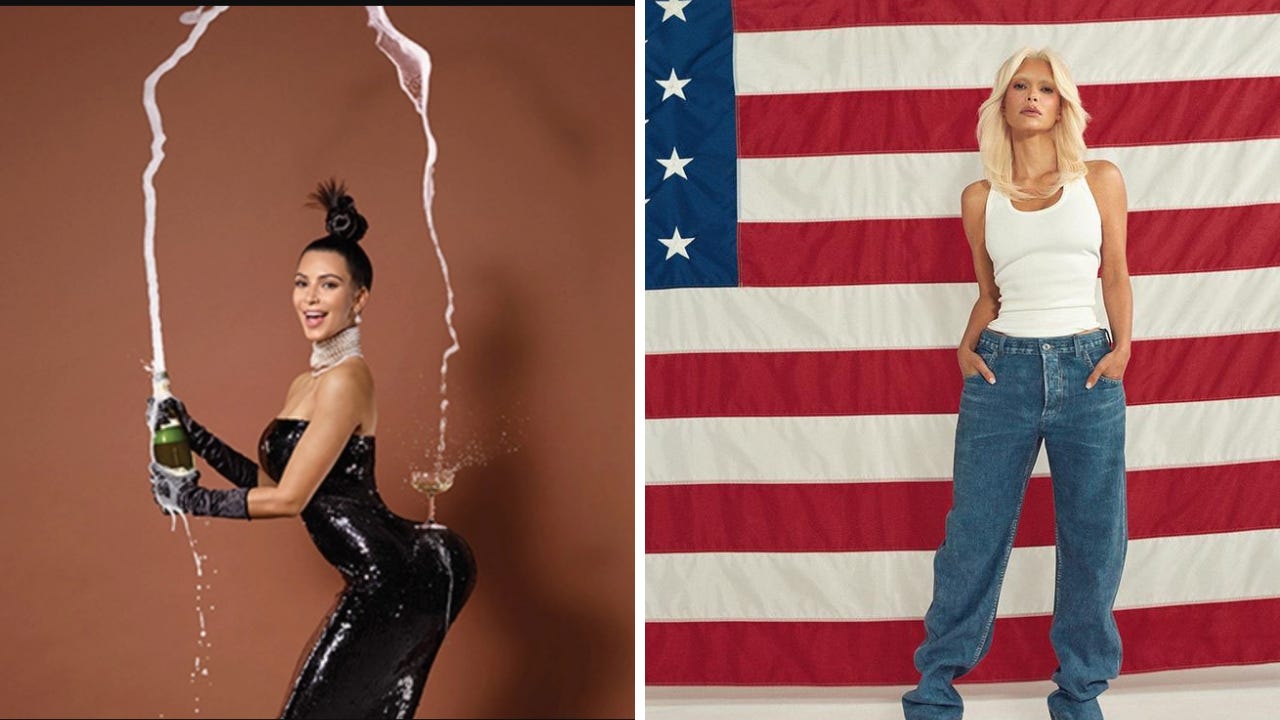Content Warning: eating disorders, Kardashians
This month, an announcement struck fear in the hearts of Gen X and millennial women everywhere: the return of heroin chic. Behind that flamboyantly clickbaity title were so many misunderstandings, conflations, and half-truths that I’m not remotely going to link to it. But as for the overall sentiment of the headline…unfortunately, attention must be paid.
Let’s take the little article at its false premise that “heroin chic” is interchangeable with thinness. (False because “heroin chic” refers to a whole aesthetic that rejected the airbrushed and sculpted glamour ideal of the 1980s and embraced a grungier, less manicured, but still impossible standard of beauty that also required thinness.) Fine. Announcing that thinness is back is like announcing that being white is back. Body trends come and go across the decades, but since at least American Reconstruction, thinness has been the aspiration. The Kardashians taking out their BBLs signifies that they’re abandoning the proportions that made them famous, but they’ve always been open about the unhealthy lengths they go to to get and remain thin. Gwyneth Paltrow hasn’t catapulted Goop’s valuation above $200 million with her monuments to thinness, whiteness, and wealth wellness retreats because society stopped worshipping thinness.
This society fundamentally cannot disentangle health from thinness, wealth, and whiteness. Which is why the thin ideal has survived modern body positivity trends. It’s why every woman you find under the hashtag #StrongNotSkinny is still pretty much skinny. Why the TikTok That Girl Aesthetic is dominated by thin white women performing photogenically disordered eating in expensive greige athleisure.
It’s why the fat women whose bodies get celebrated are ones who can perform impressive physical feats, proof that their bodies are still productive and therefore still have some value. And why the whole body positivity movement has always centered white and light-skinned women with hourglass bodies and sharp jawlines.
I do want to focus in on Kim K for a bit. Her relationship to all of this is particularly instructive and not remotely coincidental.
Kim is a destructively savvy woman. She’s not even the only person in her family who appropriates Blackness for clout and coin, but she’s far and away the most skilled at it. For the better part of two decades, she has been marvelously cynical about what to appropriate and when. I mean, the Break The Internet photoshoot alone was breathtaking in its audacity. Hurting Black women’s feelings is a surefire way to get the kind of attention she wants, and nobody does it more successfully than she does.
But somewhere around 2020, Kim realized that Blackness had taken her as far as it could. She’s been shedding any adjacency to it ever since. First she filed for divorce from noted antisemite, misogynist, and anti-Black Black man Ye. She and her posse (sister Kourtney and professional bestie Megan Fox) all started dating variations of the same guy, playing the Glamour Girl/Rock Star trope to a T. This summer, she very loudly crash dieted her way into almost fitting into the trappings of America’s most famous white sex symbol, complete with a harsh blonde dye job. And in September, she dyed her eyebrows blonde and posed in a white tank and boyfriend jeans in front of a giant American flag.
The fact that Kim could discard the Blackness she borrowed as a costume as easily as she removed her BBL is just more evidence of her whiteness and her power. For her, the damage she’s done to us doesn’t exist anymore.
Anyway, I mentioned Reconstruction for a reason. White supremacy has weaponized thinness into a virtue rather than a physical trait for centuries. White supremacy associates Blackness with laziness, wantonness, slovenliness; and it does the same with fatness. On the flip side, whiteness and thinness are displays of discipline, productivity, and cleanliness (‘clean eating’ has it right there in the name). Just as a personal example, I’ve had multiple white women tell me that I was lucky I was Black, because Black women are allowed to be fatter. I’m not remotely alone in that experience. And as a personal aside, what the fuck?
So, maybe we are headed back to low-rise jeans and weird diets where we’re told to replace two meals a day with Special K and/or yogurt. But those values have been here the whole time.
It’s also worth noting that this shift to a less coy embrace of thinness as a virtue is happening at the same time that conservatives around the world are increasingly less coy about embracing white supremacy and fascism. The whitelash isn’t solely happening in explicitly political spaces. We (Black, brown, fat, queer, trans, disabled, poor) keep growing in cultural power, even as our political power and right to exist in the world are under siege. So of course the anti-“woke” mob has to come after our culture too. They have to reestablish that (rich, thin, straight, cis, Christian, able-bodied, and ) white is right. And since we’re so highly visible right now, they can fall back on the language of the aggrieved. As if they’re saying something radical and brave when fatphobia and racism are, if not the foundations of our society, then at least load-bearing pillars for it.
Oh yet and still, I’m optimistic about our chances in this culture war. Because even though body standards are by their nature oppressive, there are people and platforms that don’t just reclaim but vibrantly reimagine them in a way that didn’t seem remotely possible 20 years ago. There’s progress even amidst the backlash.







I have questions about Kim K. The first that comes to mind is : if nobody knows why she's famous, and she is not relatable except for maybe that 0.1% that happens to be her family and close-knit-clan, why is she on everybody's feeds? who said we all had to follow her and give her attention? Granted, here I am clicking on articles about her XD